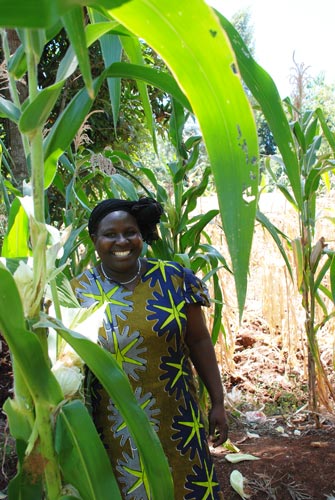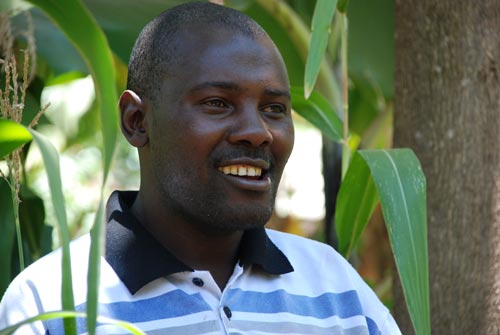
High fertilizer prices are among the major constraints facing maize farmers in Eastern and Southern Africa. “We apply just a little fertilizer, just the way you would apply salt to taste,” says a maize farmer in the Embu County, Kenya. “We lack enough fertilizer for our maize crop,” explains another one during a focus group discussion.
Kenya imports all its fertilizer, which results in high input costs borne by smallholder farmers. As agriculture forms the backbone of Kenya’s economy, the government offers farmers fertilizer at subsidized rates. “The subsidized price of Urea is about US$ 30 per 50kg bag, while without the subsidy it goes for up to US$ 50 per 50kg bag,” said the County’s land development officer Samuel Kibiu. “Despite the subsidy, not all farmers can afford the fertilizer,” he added. But even if they can, they still have to face several other challenges, such as transporting the fertilizer to their farms in Kieni, about 40 kilometers from the collection point in Embu town, after going through an elaborate process of obtaining subsidy receipts from the local agriculture office.
In October 2012, a team from CIMMYT’s Improved Maize for African Soils (IMAS) project, together with the Kenya Agricultural Research Institute (KARI) and extension workers from the Ministry of Agriculture, visited a group of farmers in the Kieni Division, Embu County. “Fertilizer is essential in Sub-Saharan Africa,’’ says Biswanath Das, IMAS project leader, “but fertilizer use in the region is amongst the lowest in the world, averaging less than 20kg per hectare.” This falls way below the recommended application rates and below average of what farmers apply in Asia and Latin America. “Most smallholder farmers in Africa are extremely risk averse, as the bulk of smallholder production is under rain-fed systems,” says Das. “As a result, farmers are reluctant to invest in expensive inputs such as fertilizer due to unpredictable rainfall.”
Making fertilizer more accessible in Africa has proved extremely difficult and researchers have thus begun searching for other ways to address the issue. The IMAS project is developing new maize varieties that are more efficient at using the small quantities of nitrogen currently applied in smallholder maize production systems in Southern and Eastern Africa. The goal is to develop maize varieties that yield up to 50% more than the existing varieties through better nitrogen use efficiency. The first set of varieties developed through the IMAS breeding pipeline showed promising results during onstation trials and is being tested by farmers in Kieni. “Despite the poor rains, we got good yields,” said Mercy Wawira commenting on the IMAS hybrid she planted on her farm. “We have seen our yields improve with this new variety,” said John Bosco Mugendi who also participated in the IMAS on-farm trial. “This variety is good,” he added. Members of the community were present to help Wawira and Mugendi harvest the maize from the small trial plot. “We hope we shall get this variety again to plant in the next season,” said Obed Nyaga Njamura, agribusiness development officer in Embu’s Kieni Division.

As yield gains observed under managed low-nitrogen stress trials on station are being replicated under farm conditions in the region, IMAS scientists feel encouraged. Together with partners in the national agricultural research systems in Eastern and Southern Africa (KARI and the Agricultural Research Council of South Africa, ARC) and Pioneer Hi-Bred in the USA, IMAS is developing nitrogen use efficient varieties to benefit smallholder maize farmers in Africa. “We broker technology through these partnerships. We also build capacity through the comparative advantage in the different institutions,” said KARI’s director Ephraim Mukisira.
 Nutrition, health and food security
Nutrition, health and food security 
